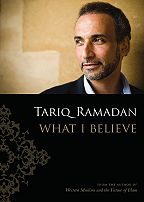Tariq Ramadan is a very public figure, named one of Time magazine’s most important innovators of the twenty-first century, he is among the leading Islamic thinkers in the West. But he has also been a lightening rod for controversy. In his new book, What I Believe, he attempts to set the record straight, laying out the basic ideas he stands for in clear and accessible prose. In the excerpt below we learn a bit about Ramadan’s stance as a thinker straddling two worlds.
My discourse faces many-sided opposition, and this obviously prevents it from being fully heard in its substance, its subtleties, and its vision for the future. Some of the criticisms expressed are of course sincere and raise legitimate questions – which I will try to answer in the present work – but others are clearly biased and attempt to pass off their selective, prejudiced hearing as “doublespeak” one should be wary of. I have long been criticizing their deliberate deafness and their ideological “double hearing”: I am determined to go ahead, without wasting my time over such strategic diversions, and remain faithful to my vision, my principles, and my project.
I mean to build bridges between two universes of reference, between two (highly debatable) constructions termed Western and Islamic “civilizations” (as if those were closed, monolithic entities), and between citizens within Western societies themselves. My aim is to show, in theory and in practice, that one can be both  fully Muslim and Western and that beyond our different affiliations we share many common principles and values through which it is possible to “live together” within contemporary pluralistic, multicultural societies where various religions coexist.
fully Muslim and Western and that beyond our different affiliations we share many common principles and values through which it is possible to “live together” within contemporary pluralistic, multicultural societies where various religions coexist.
The essence of that approach and of the accompanying theses originated much earlier than 9/11. Neither did it come as a response to Samuel Huntington’s mid-1990s positions about the “clash of civilizations” (which anyway have been largely misinterpreted). As early as the late 1980s, then in my 1992 book Muslims in the Secular State, I sated the first fundamentals of my beliefs about the compatibility of values and the possibility for individuals and citizens of different cultures and religions to coexist positively (and not just pacifically). Unlike what I have observed among some intellectuals and leaders, including some Muslim thinkers and religious representatives, those views were by no means a response to current events nor a change of mind produced by the post 9/11 trauma. They represent a very old stance which was confirmed, developed, and clarified in the course of time. Its substance can be found in my first books and articles in 1987-1989; those views were then built on and expanded in every book I wrote up to the present synthesis. A Muslim’s religious discourse, and the mediator’s role itself, bring about negative reactions in both universes of reference. What makes things more difficult is that I do not merely shed light on overlapping areas and common points between the two universes of reference but that I also call intellectuals, politicians


